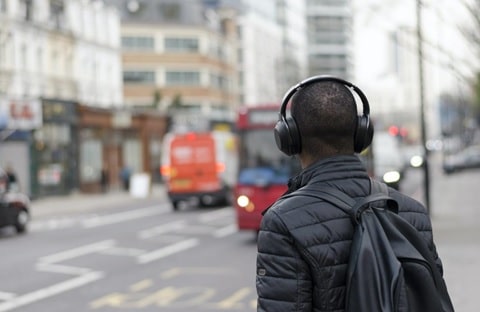
There’s something so stupendously fantastic about listening to intricately woven stories while you’re doing mundane tasks. You could be jogging or picking up the groceries as you listen to stories about brave monsters and strange men (that sounds about right). And isn’t that what’s amazing about audio storytelling? It’s like the extraordinary has peeked into the ordinary.
Though audio books never lost their charm, the success of podcasts is enough proof of the popularity of audio storytelling. According to a survey, at least 37 percent of American above the age of twelve listened to at least one podcast each month in 2020. The estimated number of people listening to podcasts was 100 million and is expected to climb up to 125 million by 2022.
Though, you may be wondering: ‘Gee, what’s so great about audio story telling?’ It’s just someone speaking into your ears! Well, true, but it’s more than that.
Here are all the benefits of audio storytelling for listeners.
Audio Storytelling is Intimate
There’s something so intimate about audio storytelling… like holding hands? Books and articles can feel impersonal and detached. Like you’re reading a message in a bottle that washed ashore. Sure, someone wrote this great poem hundreds of years ago, but you don’t know them. You may think about it a little, but ultimately, you might move on.
Now, with audio story telling, it’s like hearing a story in person. You’re hearing the storyteller’s voice and the emotions that they express through it. It makes the experience all the more personal, like you’re hearing the characters speak for themselves. It’s more natural to the point where you feel you’ve lived this experience. Would that work for horror stories, too?
The storyteller’s voice can also make the story unique. Two people narrating the same story can elicit extremely diverse responses by the audience with the manner they narrate the story, their tones, and the emotions they chose to express through voice acting.

It Immerses you Into the Story
This ties in with the previous point, but because audio storytelling is so intimate, it has the characteristic of immersing its listeners into a completely new world. The narrators work with the author to fabricate mental pictures for the audience. This helps the listener create this world immediately out of themselves.
So, you’re definitely not the only one who has sat quietly in the car staring into space as you finish your audio book. We’ve all been there! Even the neighbor that you thought was giving you judgmental glances!
Audio storytelling helps you immerse into new worlds and it’s the perfect way to unwind after a long day at work. For a few moments, you can completely find sanctuary out from your regular life. And who doesn’t need that?
Audio Storytelling is Captivating
Silences are awkward and anyone who has quietly stared at someone reaching for the same bag of chips at the junk food aisle in a supermarket can vouch for it. (Hint: it’s really awkward. Apparently, it’s not anything like those nifty romcoms, who knew?)
Listening to an audio storyteller narrate the story can become comfortable and silences can feel louder. Once you’ve finished a chapter or the whole book, the silence is deafening and you’re left to ponder over the story and the meanings. It just really adds to the experience. This is because it also matches with our sense of socialization.

When we listen to people talk, we form emotional connections with them. And because of this, reading becomes social, like we’re interacting with a human being. People are more likely to listen to an entire episode in one sitting because of this.
According to research done by Emma Rodero, a communications professor at the Pompeu Fabra University of Barcelona, studied how audio stories retain people’s attention and that a dramatized audio structure with dialogues and voice acting would stimulate it’s audience a great deal more. It elicits a more vivid imagination in the listener’s mind and those images are conjured easily.
Audio Storytelling is Innate
Verbal communication is quite intimate to human beings. Babies learn how to talk a lot quicker than they learn how to read or write. In fact, a baby as young as a few months old starts to formulate and develop language skills.
It’s innate in a human being to tell stories. Storytelling was one of the earliest ways of telling stories and providing entertainment. That’s why being able to listen to the audio storyteller’s voice helps us feel a deep-seated connection and elicits remarkable responses in the listeners. It’s something that writing can’t generate. We’re simply hardwired to have more capability of producing empathy for a conversation than a written piece.

Audio Storytelling is Good for our Well-Being
Now, with all those benefits, audio storytelling is also good for your health! Audio storytelling boosts moods and disrupts negative thought patterns. Listening to an audio storyteller narrate a story can help replace negative thoughts.
Watching screens has become a regular part of our day, but this comes with eyestrain. Audio storytelling helps relax the eyes while the listener imagines the story. The absence of blue-light would also help lull you to sleep quicker. Who doesn’t like a good shut-eye at night?
And if anyone says that reading is superior, they’re in the wrong. Apparently and according to the Journal of Neuroscience, reading and listening evoke an identical brain activity in the audience’s brain. Take that, reading elitists!
About Author:
Reid Champagne is a famous American humorist, author, and observers. Reid is one of America’s best humor columnist who has been writing for more than 35 years on a quest to bring the extraordinary into the ordinary! He is well-known for his work in the book ‘An American Walkabout.’ His writing has a unique touch of satire and irony that shines brightly in his travel writing, relationship observations, and other interesting musings.
